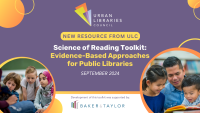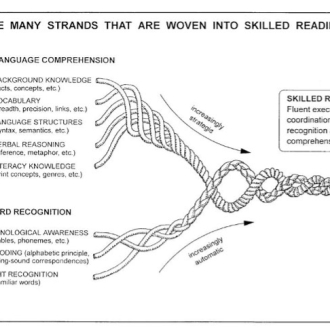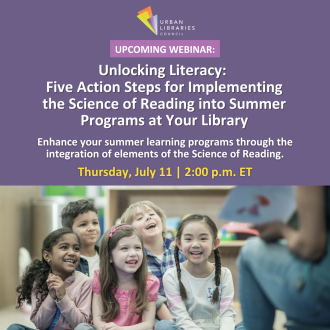The “Science of Reading” encompasses a comprehensive body of research that spans cognitive psychology, linguistics, neuroscience, and education, providing a well-rounded understanding of how children learn to read.

Science of Reading Toolkit Now Available for Public Libraries
September 2024 | This new toolkit from ULC is structured around key components essential for creating impactful youth literacy programs and recommended strategies for your library to take. The toolkit is designed to help public libraries with prioritizing equity, understanding the science of reading, designing community-focused programs, embedding structured literacy elements, and measuring program outcomes. By embracing evidence-based literacy strategies, libraries can ensure that their services are inclusive, relevant, and effective, ultimately fostering a more literate and empowered community.
Resources for Libraries
Use this page to access resources developed by ULC and ULC Education Consultant Liz McChesney related to public libraries and the Science of Reading.

Knowledge Bite
Science of Reading: Understanding the Reading Rope
August 2024 | Scarborough’s Reading Rope is a visual framework that highlights the two critical components of fluent reading: language comprehension and word recognition. The Reading Rope — developed in 2001 by Dr. Hollis Scarborough, a psychologist and early literacy expert — illustrates how the individual “strands” of learning to read are braided together to form a strong reading “rope” of skilled reading. The model consists of two main components: top strands that become more strategic over time, and the bottom strands that become more automatic, typically by the end of 3rd grade. These strands intertwine to support effective reading.
Read more in This Week at ULC newsletter.

Webinar and Best Practices
Unlocking Literacy: Five Action Steps for Implementing the Science of Reading into Summer Programs at Your Library
July 2024 | During this webinar, designed specifically for public librarians and library staff, our featured speakers focused on enhancing summer learning programs through the integration of elements of the Science of Reading. The webinar provided attendees with evidence-based strategies and tools to take the first step in fostering literacy development among young readers and summer learning participants. Those key takeaways are also reflected in the Best Practices downloadable resource.
Download the Best Practices and rewatch the Webinar
Knowledge Bite
Implications of Science of Reading Laws for Libraries
July 2024 | As public awareness of the Science of Reading and its educational practice of structured literacy gains momentum, states are enacting policies regarding using evidence-backed strategies for reading instruction. In states like Ohio and Mississippi, policies that emphasize early literacy skills and reading proficiency for Kindergarten through 3rd Graders, have been on the books for more than a decade and are showing progress. Now, as Education Week reported earlier this year, 38 states and the District of Columbia have passed laws or implemented new policies related to evidence-based reading instruction since 2013.
Read more in This Week at ULC newsletter
Blog Post
Boost Summer Learning with Science of Reading Elements
June 2024 | Summer learning programs in public libraries can be a vital resource for maintaining and improving early literacy skills, as well as help close achievement gaps brought about by systemic barriers in education. Here are five strategies to easily integrate the science of reading into your ongoing summer programming.
- Support parents and caregivers by sharing books that promote letter-sound recognition and letter patterns.
- Provide programs to foster phonemic awareness in new readers.
- Enrich your collection with phonics-based board games and word games.
- Establish a reading buddy program.
- Invest in culturally affirming, diverse books.
Knowledge Bite
How 100 Years of Debate Brought About the ‘Science of Reading’
May 2024 | Reading instruction is core to how a child learns to read and read fluently. However, the methods and curriculum used to teach reading has been intensely debated for over 100 years. This instructional debate falls largely into two camps: phonics and immersion. Proponents of phonics-based instruction emphasize the relationship between letter and sound (grapheme-phoneme). While the other method emphasizes immersion into beautiful, rich language and children’s literature, allowing reading to emerge naturally.
Read more in This Week at ULC newsletter.
Knowledge Bite
A Look at the Current Crisis in Literacy Rates
April 2024 | In a young person’s education, the ability to read at a third-grade level often marks the transition between “learning to read” and “reading to learn.” Reading at this level can be tied to anticipated outcomes for a student’s ability to graduate from 8th-grade, secondary school success, and economic mobility.
Although reading is a central and civil right and essential skill, the nation’s assessment tool, the National Assessment of Educational Programs (NAEP) report, showed that in 2022, only 32% of fourth-graders could read at grade level. This is a challenge for educators, as remediating a reading issue for a student becomes significantly more complicated after 3rd Grade. The pandemic exacerbated the decline in reading scores, especially for children in disinvested communities.
Read more in This Week at ULC newsletter.
Library Example
Toledo Lucas County Public Library
Helping children learn to read is one of the Toledo Lucas County Public Library's strategic goals. So the library is all on board to offer direct parental, caregiver and educator support to the effort of all children becoming strong readers. This effort works to address and combat the Ohio Department of Education’s report that 40 percent of the state's third-graders are not reading at grade level.

The Urban Libraries Council’s Science of Reading work is generously supported by Baker & Taylor.
